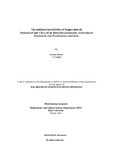| dc.contributor.advisor | Hossain, Dr. Mohammed Mahboob | |
| dc.contributor.author | Meem, Umara | |
| dc.date.accessioned | 2022-11-20T04:52:06Z | |
| dc.date.available | 2022-11-20T04:52:06Z | |
| dc.date.copyright | 2022 | |
| dc.date.issued | 2022-03 | |
| dc.identifier.other | ID: 17236009 | |
| dc.identifier.uri | http://hdl.handle.net/10361/17584 | |
| dc.description | This thesis is submitted in partial fulfillment of the requirements for the degree of Bachelor of Science in Biotechnology 2022. | en_US |
| dc.description | Catalogued from PDF version of thesis. | |
| dc.description | Includes bibliographical references (pages 56-58). | |
| dc.description.abstract | Bacteria are getting highly resistant to antibiotics throughout the time and are getting harder to
treat. This project focused on up to which percentage an essential oil can inhibit a multi-drug
resistant pathogen, and what are the factors that may vary the outcome. At first, the bacteria
sample were collected from tertiary care hospitals. Then biochemical tests were done to
confirm their identity. Peppermint oil, mustard oil, and clove oil were selected as essential
oils. As pathogenic bacteria, three gram-negative PDR, and MDR bacteria including Klebsiella
pneumonia, Acinetobacter baumannii, and Pseudomonas taetrol were selected which are
common pathogens in the Bangladeshi scenario. To determine the antimicrobial activities of
the oils, three methods were followed. First, the organisms were exposed to various
concentrations (prepared by dilution in physiological saline) of the oil and then spread on
different agar media plates. The other two procedures were the disc diffusion and agar diffusion
method. Peppermint oil was capable of inhibiting Acinetobacter baumannii, Klebsiella
pneumoniae, and Pseudomonas taetrolens up to 94.06%, 44.51%, and 61.02% respectively.
Mustard oil was capable of inhibiting Acinetobacter baumannii, Klebsiella pneumoniae, and
Pseudomonas taetrolens up to 51%, 42%, and 38% respectively. Clove oil was found to be
most effective and was capable of inhibiting Acinetobacter baumannii, Klebsiella
pneumoniae, and Pseudomonas taetrolens up to 100%. This project showed the potential of
essential oils in treating multi-drug resistant bacteria and the factors that need to be focused on
to develop medicine incorporating these oils. | en_US |
| dc.description.statementofresponsibility | Umara Meem | |
| dc.format.extent | 65 Pages | |
| dc.language.iso | en_US | en_US |
| dc.publisher | Brac University | en_US |
| dc.rights | Brac University theses are protected by copyright. They may be viewed from this source for any purpose, but reproduction or distribution in any format is prohibited without written permission. | |
| dc.subject | Antibacterial activities | en_US |
| dc.subject | Peppermint oil | en_US |
| dc.subject | Mustard oil | en_US |
| dc.subject | Clove oil | en_US |
| dc.subject | Klebsiella pneumonia | en_US |
| dc.subject | Acinetobacter baumannii | en_US |
| dc.subject | Pseudomonas taetrolens | en_US |
| dc.subject.lcsh | Medicinal plants | |
| dc.subject.lcsh | Pneumonia. | |
| dc.title | The antibacterial activities of Peppermint oil, Mustard oil and Clove oil on Klebsiella pneumonia, Acinetobacter baumannii, and Pseudomonas taetrolens | en_US |
| dc.type | Thesis | en_US |
| dc.contributor.department | Department of Mathematics and Natural Sciences, Brac University | |
| dc.description.degree | B. Biotechnology | |

